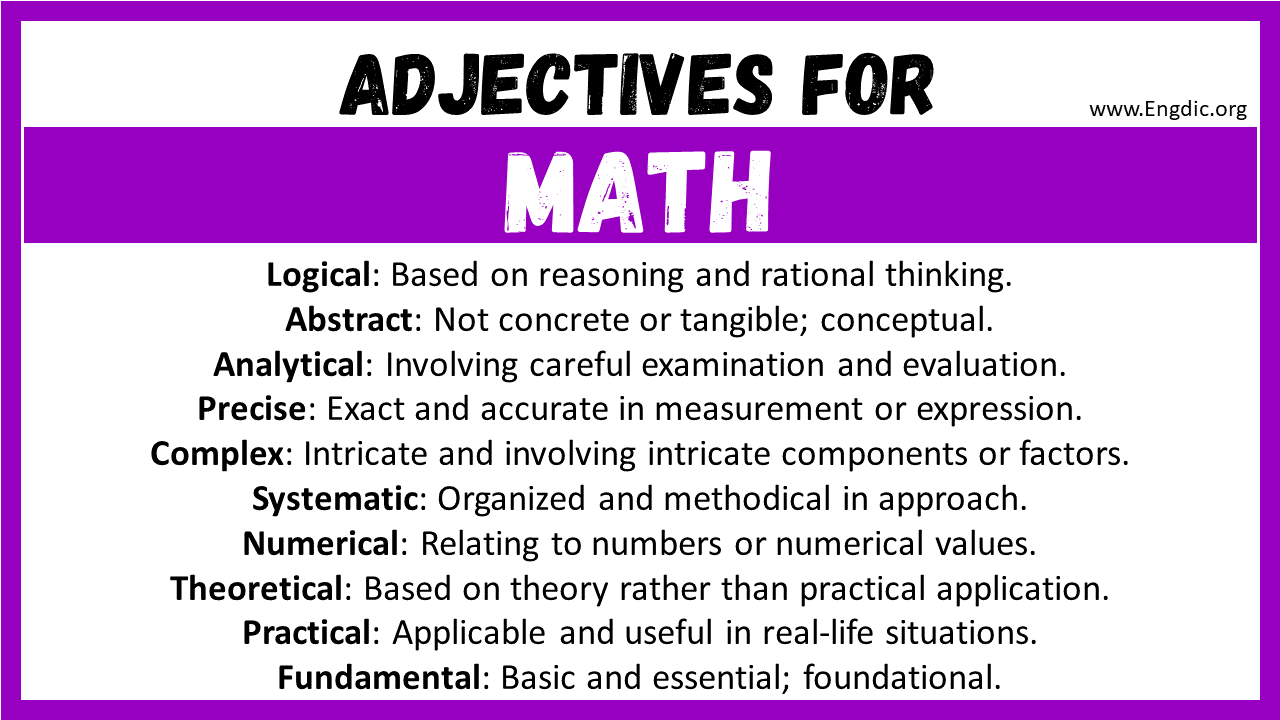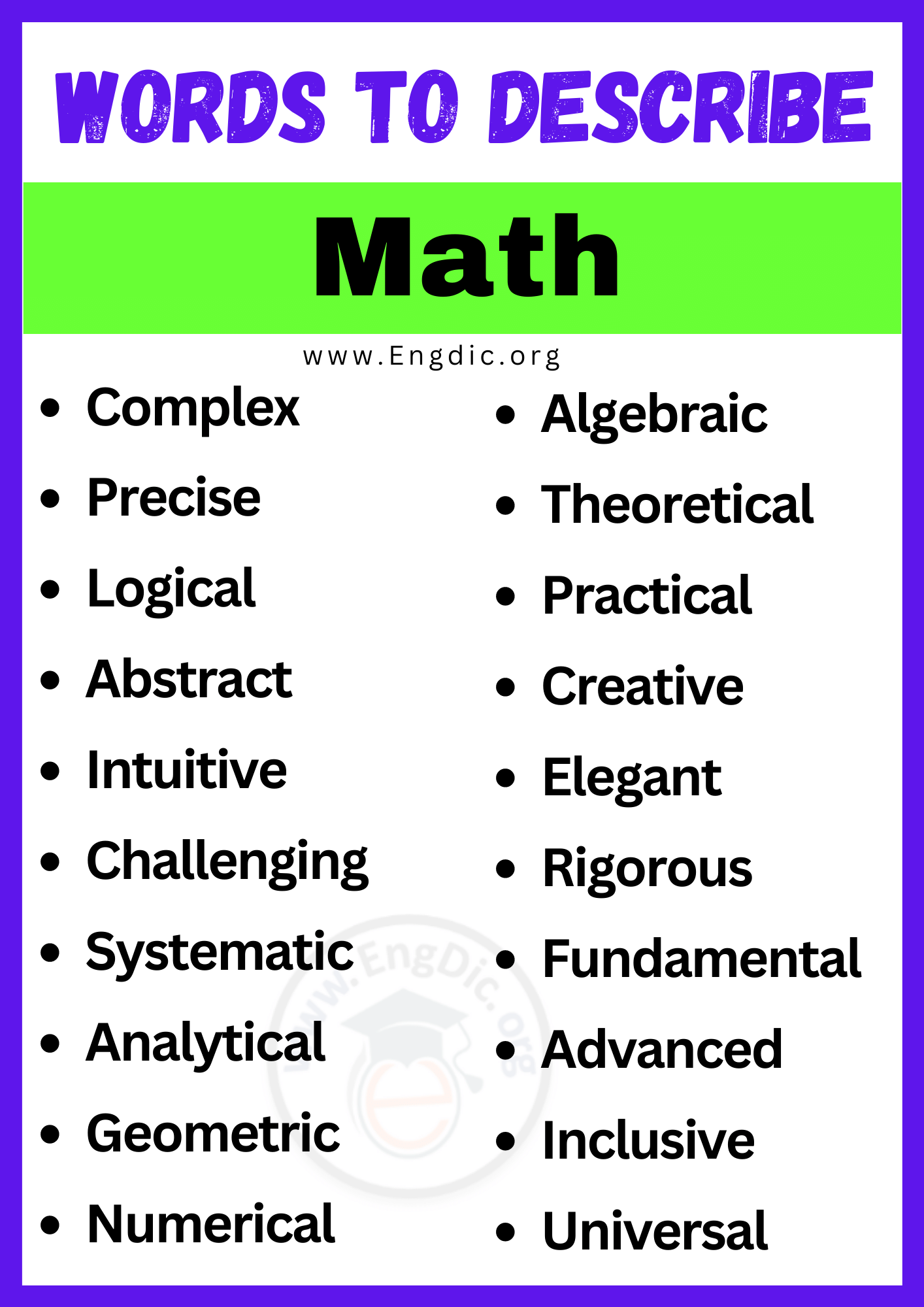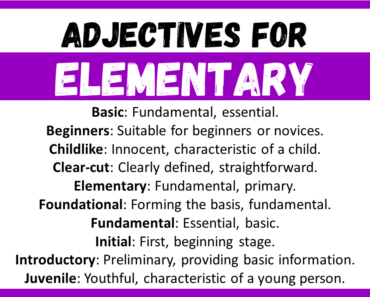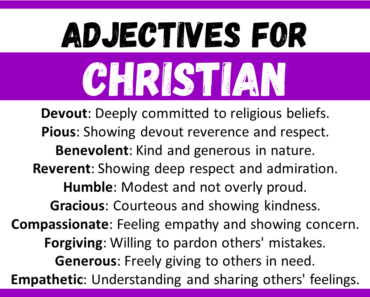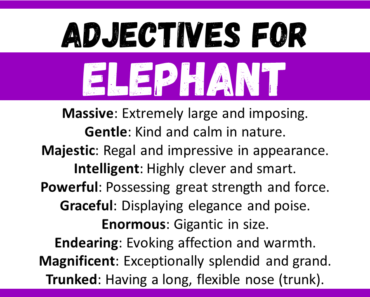Math, short for mathematics, is a universal language that allows us to make sense of the world around us through numbers, shapes, and patterns. It encompasses a diverse range of concepts and techniques used to solve problems and quantify relationships. Within the realm of mathematics, various words are employed to describe its rich tapestry. From terms like “algebra” and “geometry” to “calculus” and “statistics,” these descriptive words provide us with a vocabulary to navigate and communicate the intricacies of this fascinating discipline.
Adjectives for Math
Here are the 20 Most Popular adjectives for math:
- Complex
- Precise
- Logical
- Abstract
- Intuitive
- Challenging
- Systematic
- Analytical
- Geometric
- Numerical
- Algebraic
- Theoretical
- Practical
- Creative
- Elegant
- Rigorous
- Fundamental
- Advanced
- Inclusive
- Universal
Adjectives for Math Teacher:
- Knowledgeable
- Patient
- Engaging
- Passionate
- Inspiring
- Dedicated
- Approachable
- Supportive
- Encouraging
- Skilled
Adjectives for Math Class:
- Interactive
- Collaborative
- Stimulating
- Challenging
- Dynamic
- Structured
- Comprehensive
- Enriching
- Thought-provoking
- Engrossing
Adjectives for Math Test:
- Assessing
- Evaluative
- Comprehensive
- Time-bound
- Thorough
- Rigorous
- Analytical
- Conceptual
- Problematic
- Diagnostic
Words to Describe Math with Meanings
- Logical: Based on reasoning and rational thinking.
- Abstract: Not concrete or tangible; conceptual.
- Analytical: Involving careful examination and evaluation.
- Precise: Exact and accurate in measurement or expression.
- Complex: Intricate and involving intricate components or factors.
- Systematic: Organized and methodical in approach.
- Numerical: Relating to numbers or numerical values.
- Theoretical: Based on theory rather than practical application.
- Practical: Applicable and useful in real-life situations.
- Fundamental: Basic and essential; foundational.
- Universal: Applicable or valid for all cases.
- Intuitive: Understood or perceived instinctively, without reasoning.
- Cognitive: Relating to mental processes and understanding.
- Mathematical: Pertaining to the study or application of mathematics.
- Computational: Involving mathematical calculations or algorithms.
- Proportional: Exhibiting a consistent relationship in size or amount.
- Geometric: Relating to the study of shapes and spatial relationships.
- Algebraic: Involving mathematical symbols and operations.
- Statistical: Relating to the analysis and interpretation of data.
- Inductive: Based on specific observations and generalizing patterns.
Example Sentences for Math Adjectives
- The logical conclusion is that A equals B.
- Picasso’s artwork is known for its abstract style.
- She used an analytical approach to solve the problem.
- The recipe requires precise measurements of each ingredient.
- Quantum physics is a complex field of study.
- The scientist followed a systematic procedure during the experiment.
- The student excelled in numerical calculations.
- The theory has theoretical implications for future research.
- The workshop provided practical tips for financial management.
- Understanding basic math concepts is fundamental for advanced learning.
- The law of gravity is a universal principle.
- She had an intuitive understanding of mathematical patterns.
- The test measures cognitive abilities and problem-solving skills.
- Mathematicians rely on mathematical formulas and equations.
- Supercomputers can perform computational tasks at incredible speeds.
- The length of a rectangle is proportional to its width.
- The architect used geometric principles to design the building.
- Algebraic equations involve unknown variables and operations.
- The poll results were analyzed using statistical methods.
- Through inductive reasoning, she arrived at a general conclusion.
Explore More Words:
FAQ’s
How to describe explorers in writing?
Explorers in writing can be described as adventurous individuals who embark on journeys to discover new lands, cultures, and possibilities, braving the unknown and pushing the boundaries of human knowledge and understanding.
What are the 4 types of math?
The four main types of math are arithmetic, algebra, geometry, and calculus, each focusing on different aspects of numbers, equations, shapes, and calculations to solve various mathematical problems and explore mathematical concepts.
What is the hardest math?
The perception of the hardest math varies among individuals, but some branches of mathematics, such as advanced calculus, abstract algebra, and theoretical physics, are often considered challenging due to their complex concepts, intricate theories, and rigorous problem-solving requirements.
Who found zero?
The concept of zero as a mathematical symbol and placeholder was developed independently by ancient civilizations, including the ancient Mayans, Babylonians, and Indians. The Indian mathematician Brahmagupta is often credited with formalizing and popularizing the concept of zero in the 7th century.
